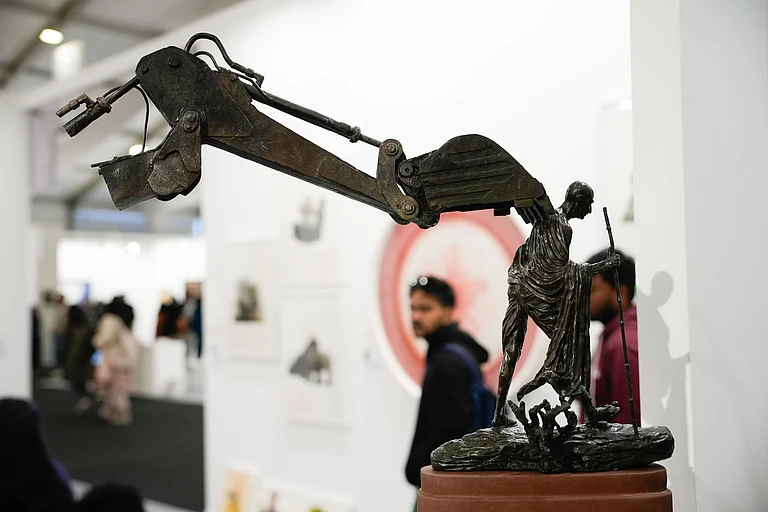"The perils of pop history," says a famous historian of modern India, "are very grave. You want to criticise the Mahatma? Then take issue with his political philosophy, why, for God's sake, do we have to examine his stool? Similarly, for Jinnah. One secular speech after the achievement of Pakistan does not a secular politician make."
In his book Liberty or Death, 31-year-old British writer Patrick French chronicles his disappointment with India's freedom heroes. Far from being the heroic head of the national family, Mahatma Gandhi, obsessed with fads about diet and defecation, was actually a bit of a crank who had close relations with big industrialists and travelled with a vast and 'extravagantly poor' entourage. And Mohammad Ali Jinnah, French suggests, was not the two-tone shoe-clad villain of the freedom struggle but a victim of the ignoble Gandhian gang.
"The basic point about such books," says Aditya Mukherjee, teacher of history at Jawaharlal Nehru University, "is how the publishing industry is coming to be structured. Books such as this are seen as likely to sell." Professor Mushirul Hasan says that in times when there is general disillusionment with national heroes, the middle class seems to be searching for 'anti-heroes'. "In course of time," says Hasan, "the pan-Indian view of Gandhi and Jinnah will probably disappear and regional movements and their heroes gain increasing legitimacy...."
"I disagree with some of Gandhi's views but that does not take away from his remarkable contribution. He introduced a discourse in politics and society that we seem to have forgotten about. His so-called 'fads' tell you nothing about him," Hasan comments.
So, if French's book sells well—according to reports the sales have been very good—it is because a cynical, globalised public has decided that it's fed up with politicians as heroes. "These sensationalist upstarts," says a senior lecturer, "driven as they are by the market place, should not be taken too seriously."
Indeed, most Indian historians refuse to take French seriously. "Look," says Shahid Amin, "I haven't even read this book. All I know is that your magazine has extracted it, so I'm afraid I cannot even react to it." Professor Ravinder Kumar, director of the Nehru Memorial Museum Library, agrees. "French is not the point and I don't think a French-centred discussion would achieve anything. Perhaps it would be better to understand how much work there already exists on Gandhi and Jinnah."
Indeed, if castigating the Mahatma as a 'bourgeois' leader is the intention, then this was done not only by contemporaries of Gandhi but by a number of other writers, most importantly the Marxist historians who have commented—several decades ago—that Gandhi refused to include the industrial strike in the armoury of 'satya-graha' and that he never broke off ties with industrialists like the Birlas and the Sarabhais who generously supported the Congress. If prevalent cynicism with politics requires that we demonstrate how Gandhi was a wily politician as French contends, then even this has been explained in detail by Judith M. Brown who shows how he captured the Congress machine by creating 'subcontractors', or key lieutenants in his own image, to spread his message.
If the post-Freud mind urgently requires a psychoanalysis of the Gandhian 'id', then this has also been done before in works such as Erik Eriksson's book, Gandhi's Truth, which looks at serious psychological problems in the Gandhian persona and shows the creative use he made of problems such as identity crisis. In fact, Gandhi emerges as almost a 'sick' person in Eriksson's study. And if the defecatory patterns of Gandhi are the need of a scatologically-inclined generation, then this too has been done before by Arthur Koestler in the '70s when he talked of Gandhi's experiments which, as historian Mridula Mukherjee of JNU points out, "were never a secret".
GANDHI and his followers themselves were extremely open about their private lives and these things were debated and argued over in public," Mukherjee says. "Gandhi was a different sort of a politician, he was trying to lead a complete life, spiritually and politically. In that sense, he was a spiritual leader. It is unnecessary and unfair to divert attention to these health and diet matters. From a relatively narrow middle class movement, Gandhi transformed the freedom struggle into one that captured the hearts of millions of people. He remained a student of truth all his life, which is why there may have been changes in his stances. He was constantly evolving. How many today have the courage to open their lives so totally to public scrutiny? Gandhi himself freely and frankly discussed his relationship with his wife and sons...."
Nor is French the only brave rehabilitator of Jinnah. Writers such as Jamnadass Dwarkadass have written sympathetic accounts of him before, as has S.K.Majumdar in his book, Gandhi and Jinnah written as far back as 1975. And the well-known Ayesha Jayal in her book The Sole Spokesman has already written that, "the Congress wanted partition, Jinnah didn't".
Mushirul Hasan quotes a couplet from Ghalib: "After killing me, my beloved decided she will never kill again," to describe Jinnah's famous 'secular' August 11 speech in the Constituent Assembly of Pakistan. "After the Direct Action which the Muslim League launched, which led to the Calcutta killings, it is difficult to sustain the image of Jinnah as a secular leader,"
Hasan says. Ravinder Kumar points out that Jinnah's speech never got the kind of publicity in Pakistan as it should have. In fact, in Pakistani historian Sharifal Mujahid's subsequent book Jinnah, An Interpretation, the speech had to be deleted. "Mr French's personal disappointment need not concern us in our 50th year," says Mukherjee. "Gandhi struggled against human frailty in the open, let's not blame him for the wrong reasons. He never claimed to be a saint, it was Tagore who gave him the title 'Mahatma'. Perhaps French is feeling let down because he expected to find an Indian 'guru' and didn't."
Amin says French is free to write what he likes. But adds that just because something is packaged in England doesn't mean we should develop a taste for it. His own work concentrates on understanding how the Mahatma's persona registered in the popular consciousness and in what way Gandhi became a 'mahatma' in the relationship between him and his followers. But should professional historians write for more popular audiences to preclude the Frenchs of the world from charting the public's sense of history? Amin says yes.
"There has to be a new relationship between evidence and language—every archival finding need not be a separate sentence. Some of us should find new ways of writing and think about how we want to narrate history." K.N. Panikkar, professor of modern history at JNU says: "Historians must definitely get out of the classroom and speak to the people. Some of the history that is being circulated is certainly not objective."
Patrick French may be a good read, but is, by professional judgement, bad history.


























